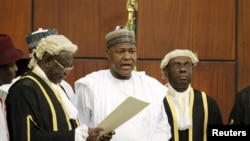Nigeria’s ruling All Progressives Congress (APC) was dealt a setback Tuesday when lawmakers turned against their party while electing leaders of the National Assembly.
Ever since the APC saw Muhammadu Buhari elected as president and won a majority of seats in Nigeria’s Senate and House of Representatives, the question has lingered: can the coalition of longtime opposition figures and defectors from the former ruling party govern together?
The answer seemed to be no on Tuesday, when APC lawmakers in both houses collaborated with members of the opposition Peoples Democratic Party, or PDP, to go against the party leadership and elect their own candidates for Senate president and speaker of the House of Representatives. Bukola Saraki is now Senate president while Yakubu Dogara is now House speaker.
Both Saraki and Dogara are APC members, and the APC still has majorities in both houses. But analysts say the failure of the APC’s leadership to control its lawmakers bodes ill for party unity, and perhaps also for President Buhari’s agenda.
Idayat Hassan is the director of the Centre for Democracy and Development think tank.
“They are in serious disarray as a party. This also shows them the challenge that they have to build a party. It’s another thing to win office. But how to hold onto power will now be the most important thing,” said Hassan.
Until this year, the Peoples Democratic Party seemed an unassailable force in Nigeria’s politics, having held the presidency every year since Nigeria returned to democracy in 1999. But after trouncing the PDP in this year’s elections, the APC had the potential to wield near-absolute power in the National Assembly.
Political scientist and director of the Center for Legislative Studies in Africa Usman Mohammed says the APC's failure to rally lawmakers behind its choices to lead the House and Senate left an opening for the PDP.
“And your party has produced majority. Why are you now giving a crack in the wall for PDP to come in?” he asked.
By helping Saraki win the Senate presidency, the PDP will now be able to influence the appointment of cabinet ministers and key aides to Buhari, Mohammed said, and perhaps leave a mark on Mr. Buhari’s efforts to fight Islamist insurgent group Boko Haram and stamp out corruption. Both issues were pillars of Buhari’s campaign.
“So they have a strategic position. And understanding Saraki coming from PDP itself, with some governors in the Senate, Buhari will not have an easy ride in the Senate,” said Mohammed .
While it is a loss for APC leadership, Hassan says a newly empowered PDP, acting as a counterweight to the APC’s superior numbers, may ultimately lead to better governance in both houses.




